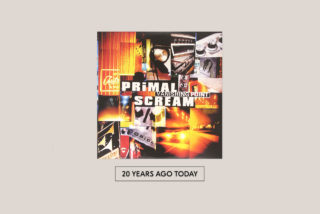At twenty years old Primal Scream’s ‘Vanishing Point’ now looks like their most significant album
A slew of significant albums all came out in 1997 – Sam Walton is revisiting each one on their double decade anniversary

A slew of significant albums all came out in 1997 – Sam Walton is revisiting each one on their double decade anniversary
The inclination for more high-minded musicians to cite “imaginary films” as the perfect setting for their music is so long established today that it’s become cliche. At the start of the 1990s, however, Brian Eno had just concluded his run of three successful ‘Music For Films’ albums, and electronic music, in its post-acid house comedown, was starting to emphasise more than just rhythm, splintering into genres that invoked a certain cinematic scale. Couple that with the slow rise of post-rock and trip-hop, with their inherent scene-setting qualities, and Britpop’s obsession with the aesthetics of 1960s cult movies such as Get Carter and Bullitt, whose ice-cool soundtracks were as famous as their stars, and by 1997 we had reached peak “music for an imaginary film”: dreaming up accompaniments for non-existent movies was no longer the preserve of niche electronica types and vinyl hoarders, but also of the artsier end of white British guitar music.
In this context, then, how refreshing to encounter ‘Vanishing Point’, which inverted the well-worn trope: here, for once, was an alternative soundtrack to an actual film (1971’s hippie/existential car chase flick of the same name) described at the time by Bobby Gillespie as an “anarcho-syndicalist speedfreak road-movie record”, replacing the film’s original country-rock and soul cues with something far darker and (depending on one’s interpretation of the film) more fitting to the movie’s nihilistic sense of spiralling freedom: swathes of fuzz and reverberant dub basslines pepper the first half, abstract blasts of electronic noise swoosh around the speakers throughout, and the entire album is beset by a fuggy, foggy sense of psychedelic paranoia that’s periodically interspersed with moments of rather beatific calm. It’s not quite a concept album – there’s none of the slavish attention to detail here that they require – but still, conceptually, ‘Vanishing Point’ represented a huge step up from the the tepid Stones pastiches of previous album ‘Give In But Don’t Give Up’. Indeed, in hindsight, ‘Vanishing Point’ is as big a reinvention and artistic statement as the band performed for ‘Screamadelica’.
Not only that, but it also contains some of most ambitious music Primal Scream had ever made. ‘Kowalski’, the album’s talisman, is the sound of evil-eyed krautrock psychosis, its samples about “blue meanies on wheels” and “speed meaning freedom of the soul” taken directly from Vanishing Point and perhaps fitting for a band enduring such well-publicised drug habits. But it’s far more than just substance-fuelled jamming: structurally confrontational and sonically adventurous, it’s shot through with the exhilarating paradox of feeling like it’s moments from self-combustion while simultaneously also throttlingly tough. The same applies to the strutting/wailing menace of ‘If They Move, Kill ’Em’, bolstered with authentic baggy swagger by Mani, freshly plucked from the ashes of The Stone Roses to give ‘Vanishing Point’ a definitive anchor. Even on the twin “conventional” rock songs, ‘Motorhead’ and ‘Medication’, a revving-motorbike carnality exists that pushes at the boundaries of how to produce numbskull rock’n’roll in the modern era.
And then there’s the calm: the album outro of ‘Get Duffy’ and ‘Trainspotting’ – the former all Lalo Shiffrin-indebted cool, the latter an actual film commission – both expand the edges of an already musically sprawling album such that ‘Vanishing Point’ starts to pick up where ‘Screamadelica’’s heady atmosphere left off. Centrepiece ‘Star’, too, ostensibly another soppy Bobby Gillespie ballad full of frail protestations and romanticism, still finds time to imagine itself more as a Chemical Brothers production than anything one might’ve expected as a follow-up to ‘Rocks’.
From the point of view of Primal Scream’s biography, ‘Vanishing Point’ at twenty looks like their most significant album. For one, it was the springboard to the band’s most artistically creative and fulfilling run of albums, laying the ground for the scabrous ‘XTRMNTR’ and ‘Evil Heat’ records, which today, together with ‘Vanishing Point’, make for as fine a trilogy of post-everything protest albums as one could hope for. For another, it was the first time Primal Scream had pioneered alone, without the guidance of an external producer. Sure, Andrew Weatherall is credited here on one track, but the band self-produce on all eleven, and the sense that this is their vision – particularly that of Gillespie and Mani – is palpable, from the album’s concept downwards. That confidence would embolden them for ‘Vanishing Point’’s follow-ups.
On a broader level, though, ‘Vanishing Point’ is also now an integral member of a gang of albums from the first half of 1997 in which established bands swam against the conventional musical stream, attempting to broaden the horizon after several years of Britpop parochialism. It’s easy to forget that Primal Scream were hugely popular – they headlined the pyramid stage at Glastonbury ’98 as part of their ‘Vanishing Point’ tour – and alongside ‘OK Computer‘, ‘Ladies And Gentlemen We Are Floating In Space‘ and ‘Blur‘, their fifth album demonstrated that supposedly traditional rock-band line-ups could once again make forward-looking, rather gravity-defying music that owed just as much to artistic ambition as it did to popular appeal.
Of those particular four horsemen, too, ‘Vanishing Point’ has arguably aged the best, perhaps because it’s the least defined: with inchoate swirls in place of anything more concrete, no direct heirs, and with the band themselves never attempting the same tricks again, ‘Vanishing Point’ now stands as something of a cut-off, timeless beacon – a standalone soundtrack to far more than just a single film.
To read all the other entries in Sam’s Twenty Years Ago Today blog, click here.